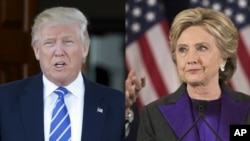Democrat Hillary Clinton has now amassed more than a 2-million popular vote lead over U.S. President-elect Donald Trump, who won the White House by winning where it matters, in states with enough electoral votes to become the country's 45th chief executive.
As vote counting continued in some states, Clinton's advantage stood Wednesday at 2,017,563, a figure that could grow because uncounted ballots remain in states where she won, especially in California, the country's biggest state along the Pacific Ocean shoreline.
No matter how large it ends up, Clinton's popular vote lead will not change the outcome of the November 8 election. She will become the fifth presidential candidate in U.S. history, and the second in the last 16 years, to win the popular vote but lose the election because of the country's two-century-old, constitutionally mandated Electoral College system of picking its presidents.
U.S. presidential elections are essentially individual elections in each of the 50 states and the national capital city, Washington, with the winner in each state getting all of its votes in the Electoral College. Winning candidates need a majority of at least 270 of the 538 electoral votes, with the biggest states holding the most sway in the outcome.
Trump won numerous states by relatively small margins, while Clinton, a former U.S. secretary of state who was looking to become the country's first female president, piled up a huge vote count edge in California and New York. That has left her with a popular vote lead nationally, with Trump likely winning the Electoral College vote 306-232 when all the state-by-state results are finalized.
Trump, a billionaire real estate mogul who is now appointing key officials for his new administration, has at various times condemned the use of the Electoral College in picking presidents, while also saying that it is "actually genius in that it brings all states, including the smaller ones, into play."
On Tuesday, Trump told New York Times reporters he would "rather do the popular vote" and was "never a fan of the Electoral College until now," through use of which he is now president-elect.




